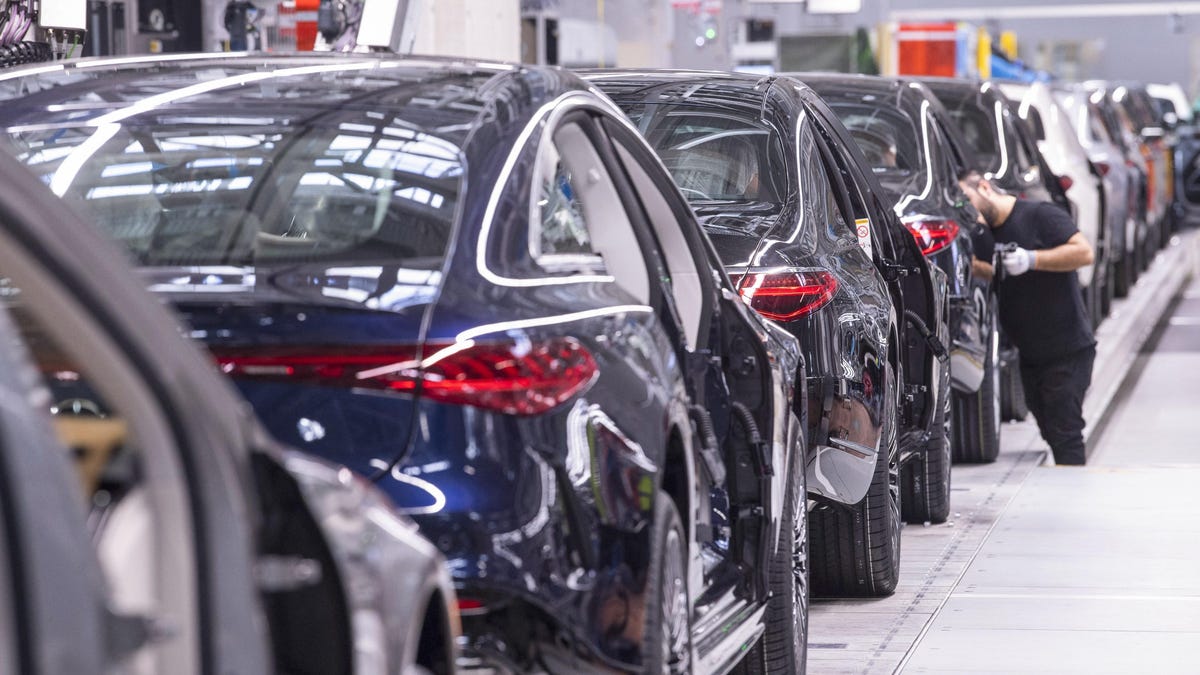Oh, happy days: Mercedes-Benz seems to be getting rid of its silly and convoluted electric vehicle naming scheme in favor of unifying both gas-powered and EV variants of its cars under one nameplate. That means the EQS name is going away, and it’ll be replaced with the “S-Class” nomenclature.
This news, broken in Autocar, also reveals that MB will keep an internal combustion-powered S-Class for its eighth generation, due in 2030. That move will come despite its pledge to wholly replace it with a second-generation EQS at the end of the decade. CEO Ola Källenius confirmed the two pieces of news in the publication, saying, “There will be two S-Classes in the future – ICE and electric.” I’ve got even more good news – the two cars will share interior and exterior designs, so that should come as a welcome surprise to folks (me) who don’t like the current look of the EQS.
Despite these similarities, the two cars will not share an architecture, according to Autocar. The S-Class EV will use the upcoming MB.EA Large platform and te ICE car will build off of today’s MRA architecture. It’s a similar plan to what Mercedes-Benz has done with the new G-Class. It comes with both gas-powered and EV-powered drivetrain options, but they both have extremely similar styling.
Here’s a little more on how Mercedes-Benz came to this decision, and how lackluster EQS demand hurt the chances of the model name continuing, according to AutoCar:
The unification of the two models follows disappointing sales of both the S-Class and EQS, with deliveries of the ICE car plummeting by 37% in the first quarter of 2024. This has resulted in S-Class production being cut to just a single shift at the Factory 56 facility in Sindelfingen, Germany, which also produces the EQS.
Mercedes initially projected that electric models would account for more than 20% of its 2,043,800 global sales in 2023. However, they achieved only an 11% share, despite a 73% increase in the firm’s EV sales compared with 2022.
This shortfall undermines Källenius’s earlier goal of pure-electric and plug-in hybrid models making up 50% of the brand’s annual sales by the end of 2025. In a strategy update made earlier this year, Mercedes revised this forecast to 50% by 2030.
In Europe, this sales lag has resulted in the EV car parc growing by just 2% so far in 2024 compared with last year, prompting manufacturers such as Audi, Ford and Porsche to change tack and refocus on ICE and hybrid cars.
The outlet asserts that if the S-Class is going to continue to have ICE options, the E-Class’s next generation probably will too – going along with its electric-powered version that’ll serve as a successor to the EQE sedan. A source told Autocar that the two vehicles are “closely related from a technical standpoint” and to build one without the other would “greatly affect the economies of scale” Mercedes employs.
Anyway, before the next generation of S-Class arrives, Mercedes is planning on bringing in a range of revisions and upgrades to the current EQS and S-Class, as Autocar explains:
Under the current plans, the electric EQS will gain a major technical upgrade during the second half of 2025 and the combustion-engined S-Class saloon is set to be facelifted in 2026.
The EQS has recently received mild styling revisions as part of a so-called “running change” for the upmarket electric saloon but the upgraded version will adopt a heavily modified version of the EVA2 platform.
The reworked platform will receive an 800V electric architecture instead of the 400V system in use today, which will endow it with faster charging times.
Insiders suggest the 10-80% charge time is set to be reduced by up to 10 minutes compared with today’s EQS, taking as little as 21 minutes on a high-powered charger. Its 118kWh battery will also be uprated with new chemistry, which will increase the range by 37 miles to 535 miles in its most efficient guise. This technology will be shared with the upcoming electric CLA.
The single-speed gearbox will also be replaced by a new two-speed unit, providing the upgraded EQS with added performance potential and possibly a higher top speed.
The refreshed S-Class will get a revised front end and some work done under the hood. Its existing twin-turbocharged 4.0-liter V8 will apparently be upgraded to the latest M177 V8 with a 48V mild-hybrid system. The car is also expected to get a level-three Dirve Pilot driver assistance system.
So, there’s a lot going on here, but the big news is that Mercedes-Benz is streamlining its naming scheme. I was never a fan of having two separate model lines for cars that are supposed to represent the same things, so it’s nice to see a car company being to my will.


